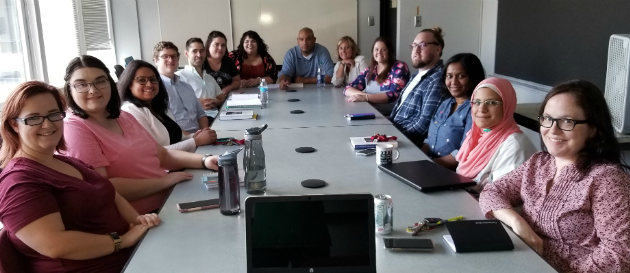
PhD Specialties
Our current areas of faculty interest include: Sex and Gender, Religion, Social Movements, Sexuality, Inequality, and Communities. Our faculty are strong in theory and in both quantitative and qualitative research methods and offer rigorous training in all three.
Read more about our areas of specialization here.
Criminology/Deviance/Criminal Justice Emphasis
PhD students in sociology may consider seeking an emphasis in criminology and criminal justice. To achieve the emphasis the student needs to incorporate the following courses, expectations, and committee guidelines into her/his program of study.
Required Courses:
CCJ 500 Foundations of Criminal Justice
CCJ 504 (Criminological Theory) or Soc 572 (Seminar in Criminology).
Two additional 500-level courses, from the following:
Soc 562 Seminar in the Sociology of Deviance and Social Control
Soc 530 Topical Seminar in Sociology (when topic is relevant)
CCJ 540 Seminar in Theory and Practice of Crime Prevention
CCJ 550 Seminar in Juvenile Justice and Delinquency
CCJ 562 Law and Social Control
CCJ 571 Seminar in Punishment and Corrections
CCJ 576 Policy Analysis
CCJ 577 Policy and Program Evaluation
CCJ 578 Seminar in Correctional Rehabilitation
CCJ 584 Administration and Management in Criminal Justice
CCJ 587 Seminar in Policing
CCJ 592 Advanced Seminar in Criminal Justice and Criminology
* Note: ONE of the 4 courses required for the concentration must be a sociology course.
Expectations:
1. Students will complete their Substantive Comprehensive Exam in the area of concentration.
2. Students’ dissertations will be on a topic related to the area of concentration.
Committees: Students’ substantive comprehensive exam committees will have at least one sociology faculty member. Students’ dissertation committees will each have at least two sociology faculty members who are members of the Graduate Faculty.
Criminology and Criminal Justice faculty who are members of the graduate faculty may serve on both substantive comprehensive exam committees and dissertation committees and they may chair substantive comprehensive exam committees. Criminology and Criminal Justice faculty who have direct dissertation status may serve as chair of students’ dissertation committees. Criminology and Criminal Justice faculty do not have to be cross-appointed sociology faculty to serve in these capacities.
Advising: Prior to the appointment of the dissertation chair, faculty advisors for PhD students should be sociology faculty members.
Certificate in Women, Gender, and Sexuality Studies
A student interested in a certificate in Women, Gender and Sexuality Studies (WGSS) should contact the WGSS coordinator and/or cross-listed Sociology faculty for the required courses and guidelines.
See also: https://cola.siu.edu/wgss/academics/graduate-certificate/
M.A. and Ph. D. students who wish to incorporate the certificate requirements into their program of study may do so. Note: ONE of the courses required for the certificate must be a sociology course.
Sociology as a Secondary Emphasis in Another Ph.D. Degree Program
A student who is enrolled in another Ph.D. degree program and who wishes to declare sociology as a secondary area must submit to the director of graduate studies a written request which includes the following: a plan of coursework, a personal reading list, and an overall program statement indicating the relationship of the area in sociology to the student's total program.
Interdisciplinary Ph.D. Degree Program in Sociology
Students who have been admitted to the Ph.D. degree program in sociology, and who wish to develop an interdisciplinary program, should review the guidelines set forth by the Graduate School. The graduate dean approves interdisciplinary Ph.D. degree programs only when they bear the endorsement of a program that offers a Ph.D. degree program A student who wishes to apply for an interdisciplinary program in which sociology will be the sponsoring program, should understand that the program of study must include substantial involvement in sociology courses and seminars, and that the program may require the student to meet other requirements similar to those established for the Ph.D. degree program in sociology.
